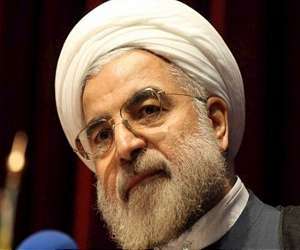Iran's Rouhani under Attack from all Sides
إقرأ هذا الخبر بالعربية
Iran's President Hassan Rouhani is clinging to power but finds himself under attack from all sides -- conservatives, reformists and the street -- as he prepares for a grilling in parliament on Tuesday.
The US withdrawal from the 2015 nuclear deal between Tehran and world powers and Washington's reimposition of sanctions have already battered the Iranian economy, and critics say it has exposed the failures of Rouhani's five years in power.
For the first time, lawmakers have summoned Rouhani to parliament to face questions over the collapsing value of the Iranian currency, over stubbornly high unemployment and corruption.
Lawmakers have already impeached his labour and economy ministers this month, and are seeking further scalps.
They have the power to impeach Rouhani himself, though he is protected by the fact that Iran's supreme leader Ayatollah Ali Khamenei said he should see out his term to 2021, despite his own harsh criticisms of the president's policies.
- Conservatives -
Despite his dim prospects, Rouhani still has the backing of moderate conservatives, including powerful parliament speaker Ali Larijani.
But many in the hardline establishment opposed his negotiations with the West and feel vindicated by the unraveling of the nuclear deal.
They have led the charge against Rouhani's cabinet, and were on Monday seeking enough votes for impeachment proceedings against his industry and transportation ministers.
"The best outcome for them is a lame duck president, as their chances will go up for (the next election) in 2021," said political journalist Fereshteh Sadeghi.
- Reformists -
As for the reformist faction, it was key to Rouhani's election successes in 2013 and 2017, seeing him as its best option after the movement was suppressed in the wake of mass protests in 2009.
But Rouhani has failed to deliver on his promises of easing civil liberties, particularly his vow to release political prisoners and reduce censorship.
Reformists now fear being tarnished by their association with Rouhani and some have broken ranks to slam the government's performance.
"What have we done with this nation? We made them miserable and wretched," said reformist MP Elias Hazrati as he voted in favour of impeaching Economy Minister Masoud Karbasian on Sunday.
"No one believes Rouhani will reform anything anymore. He was just a tool for the system, appearing to address people's demands for change without really changing anything," said Clement Therme, Iran research fellow for the International Institute for Strategic Studies (IISS).
- The street -
On the back of popular support, Rouhani won emphatic victories in the past two presidential polls.
Even with the Guardian Council barring almost all candidates, there was genuine enthusiasm for his plans to rebuild Iran's foreign standing and attract investment.
With the key part of that strategy -- the nuclear deal -- in tatters, the sense of disillusionment on the streets of Tehran is now palpable.
Many wealthier Iranians are trying to leave, while poorer areas have seen regular, low-level strikes and protests that have occasionally turned violent.
The prices of essential goods are rising rapidly, and worse pain is to come when U.S. sanctions on Iran's vital oil sector return in November.
"Look at my breakfast. I can't afford fruit anymore," a motorbike delivery man told AFP, holding up a can of lemonade and a piece of bread.
"We are afraid of this government, but there will be more protests."
- What next? -
Rouhani's problems reflect a basic contradiction of the Islamic republic, said Therme of IISS: elections are crucial to its legitimacy, but the Iranian people vote for reforms that cannot be delivered.
"The supreme leader supports Rouhani going to the end of his second term because he wants stability," said Therme.
"But he thinks that if Rouhani delivers on his policies, it will mean the end of the system," particularly by opening the country to Western cultural "invasion."
There had been talk of Rouhani as a possible successor to the aging Khamenei, but he looks increasingly likely to follow the path of his two predecessors in the presidency, Mohammad Khatami and Mahmoud Ahmadinejad, who have been effectively silenced by the establishment.
"There's nothing he can do. His hands are tied. All the focus will now go on 2021," said political journalist Sadeghi.



